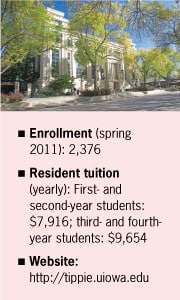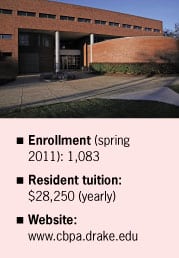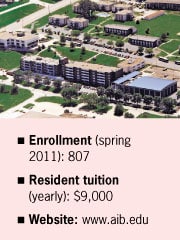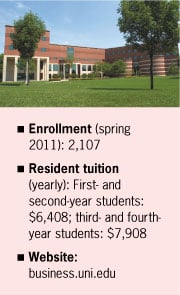Back to school
State's business colleges reflect on challenges, changes
Iowa’s business colleges all face many of the same issues.
Tuition increases and general uncertainty in the economy seem to be on everyone’s mind. Dealing with the changing nature of students is also key. And keeping up with what qualities employers are looking for can drive programs and help shape the culture at a given college.
The Business Record looked at five business colleges in the state to find out what their challenges are, what new programs and classes they are implementing and what employers are asking for out of recent graduates.

Largest question mark or challenge:
Trying to provide a good education in a tough economy is the largest challenge for the University of Iowa’s Henry B. Tippie College of Business, said Lon Moeller, the school’s associate dean for undergraduate programs.
State funding cuts and tougher giving conditions for donors due to the economy have forced the college to put a greater emphasis on getting as much scholarship money to as many students as possible, rather than giving out larger awards to fewer students.
“We’ve had more students applying for the college scholarships,” Moeller said. “And then I’ve been talking to our fund-raisers about trying to expand the scholarship pool, because that’s really important to students with increasing college costs.”
What’s new:
There’s no question today’s students are more savvy about technology than they were a generation ago, and they’re also more conscious about corporate philanthropy, Moeller said. Those two traits led to the creation of three new courses within the college during the past couple of years.
Tippie recently added a course on social entrepreneurship, aimed at bringing in an audience of students who are leaning toward working in the nonprofit sector. A class focused on sustainability started last spring, and a social media business use class will be offered in the fall.
Beyond that, the university has put emphasis on remote classes, both at the John Pappajohn Entrepreneurial Center and through online programs.
Employer demand:
Employers are asking for graduates with more effective communication skills, Moeller said. The college will put in place a more selective admissions process starting in 2013 that will include a scored writing component. It is utilizing the Frank Business Communications Center for the college’s business communications course, which has increased the emphasis on writing assignments.
Employers also are looking for well-rounded candidates. “I think a lot of employers come here and say ‘I don’t want somebody who has a 3.8 GPA who didn’t do anything outside the classroom,’” Moeller said.

Largest question mark or challenge:
Government is Drake’s largest uncertainty, said Charles Edwards, dean of the College of Business and Public Administration at Drake University.
“You’ve got increasing pressure from Washington and local state legislatures to lower tuition, or to not continue to pass big tuition increases on to students,” he said. “And increasingly politicians are getting into the picture of determining the outcomes for students.”
Raising money has also been a challenge in a tough economy, as Drake is currently in the midst of a $200 million capital campaign.
What’s new:
Drake has placed an emphasis on communications, with required courses in public speaking and writing. The university also is adding a required international business course to help students recognize that every business is affected by a global economy, and to recognize the growing cultural diversity in the Des Moines business community.
Drake has seen a large increase in the number of students in its actuarial science program, which has grown from about 100 students five or six years ago to about 300 today, school officials said. Drake is one of only 17 colleges in the country (including the University of Iowa) to be designated as a center of actuarial excellence by the Society of Actuaries.
The college has put a strong focus on professional development, now requiring students to put together a resume as freshmen, complete mock interviews and attend networking events.
Employer demand:
Employers are expecting graduates to hit the ground running, said Danette Kenne, assistant dean of the college.
“We all read the headlines of a newspaper on the challenges organizations face right now, and if they are in a position to add someone, they want someone who can bring value to the organization right away,” Kenne said.
Businesses are looking for students who can offer more than just technical skills, Edwards said. That includes graduates who can speak and write well, and are able to work on teams. It also includes a level of corporate citizenship.
“It requires, I think, a much more well-rounded student,” Edwards said.
Iow
Largest question mark or challenge:
“For us, it really is resources,” said Michael Crum, associate dean of Iowa State University’s College of Business.
With state budget cuts, the public university is heavily affected by the lack of government funding. To help counteract that, business students actually pay slightly higher tuitions than students in other colleges within the university. “We don’t like to do that,” Crum said.
High school demographics are also a cause for concern, he said. The university is hitting record enrollments right now, but expects that trend to reverse as high school enrollments decline across the state. The university will aggressively recruit students, but might have to look out of state more than in the past.
“It’s a fixed pie,” Crum said.
What’s new:
The business school is trying to instill social responsibility at the undergraduate level. Crum said the business faculty has been appalled at some of the bad behavior in the corporate world, which, although it represents just a small percentage of employees, makes headlines.
The college has established leadership programs for students to help them become leaders in campus activities and organizations. It also has put more emphasis on encouraging students to go the college’s Communication Center for advice and consultation. The number of consultations provided during the 2010-11 school year nearly tripled from the previous year, Crum said.
Also important is encouraging students to participate in a study-abroad program. As part of the university’s recently completed Campaign Iowa State fund-raising campaign, the College of Business is hoping to be able to use more funding to help students afford a semester overseas.
Employer demand:
Companies are looking for recent graduates who want to make an impact right away, but also have reasonable expectations about what their role in the company is and are willing to learn and grow into new roles, Crum said.
Accounting is a major that is popular right now, he said, as is supply chain management. Crum points to companies such as UPS and IBM that have started using supply chain termonology, such as the word “logistics,” in advertising.
Students are still being placed at a rate of better than 90 percent, but the biggest difference from pre-recession hiring patterns is likely to be a decrease in the number of job offers, Crum said.

Biggest question or challenge:
The economy has provided a big question mark for AIB College of Business, as it has for almost all colleges. Also, federal regulations have kept things in flux.
Regulations that were intended to govern for-profit colleges such as Kaplan University and Ashford University can have an effect on AIB as well, said Nancy Williams, the school’s president. The college has even hired someone to read regulations and make sure it is compliant.
The biggest challenge at AIB, Williams said, is marketing. AIB can now market to students from other states in online programs, but the bigger challenge might be marketing at home. “People don’t even know that much about us in Des Moines,” Williams said.
What’s new?
AIB is adding a new major in health information management, which will likely start in the fall semester of 2012. Also likely to begin during that school year will be degree programs in media communications and insurance services.
The school is expanding online, which allows it to market to students outside the state. It’s something the faculty has been in favor of and won awards for, Williams said. “I’d say, actually, we’re experts on online” teaching among Iowa schools, she said.
Employer demand:
Part of the reason for adding the new majors is because employers are looking for graduates in those areas, Williams said. AIB also puts an emphasis in getting students internships and part-time jobs in the community to build professional experience.
“And we talk a lot about ethics and employment,” Williams said. “Nowadays, you have to. They can sit in their office and text all day.”
The jobs are still there, though salaries are a touch lower now, she said. “Grads aren’t really coming out thinking they’re going to get a $50,000-a-year job,” Williams said. “Realistically, they know they’ve got to get in and earn that and work up.”

Largest question mark or challenge:
“I’ll set aside the budget; how about that?” asked Farzad Moussavi, dean of the University of Northern Iowa College of Business Administration, when asked about the college’s biggest challenge. “That’s the big elephant.”
On the academic side, he said, the challenge is what he calls a gap between what today’s students view as a reasonable effort and what the college expects the students to deliver. He cited a study conducted last summer by Education Outlook magazine that showed today’s students study only 14 hours per week outside of class, as opposed to the average student in 1961, who studied 24 hours per week.
“A lot of schools have lowered their expectations, and the result is the grade inflation that you see in the entire education system,” Moussavi said. “But that’s not an option for us, because we’ve built a brand based on high expectations.”
What’s new?
In response to what he feels are declining expectations at the collegiate level, Moussavi said the business school has been placing more emphasis on instilling a good work ethic into students.
One competitive disadvantage he feels Iowans have is that their backgrounds don’t make them immediately confident and assertive when they enter the job market. In response, the school started a Professional Readiness Program, where students are taught from the first day of class how to act professionally.
“The program is expected to address that missing ingredient that we call contemporary professional skills,” Moussavi said. “We want our graduates to not only know their stuff and not only be willing to work hard, but to have the assertiveness and confidence of a professional.”
Employer demand:
Moussavi said one thing the college is hearing from employers is that UNI business students have a sense of entitlement in some cases.
He said students are still getting the jobs they want for the most part. One program that has seen a drop-off in enrollment is the real estate major, which is the only one in the state, due to uncertainty in the real estate market. Though enrollment has dropped by about 300 students since the market went down, Moussavi doesn’t think demand for graduates has gone down significantly.











